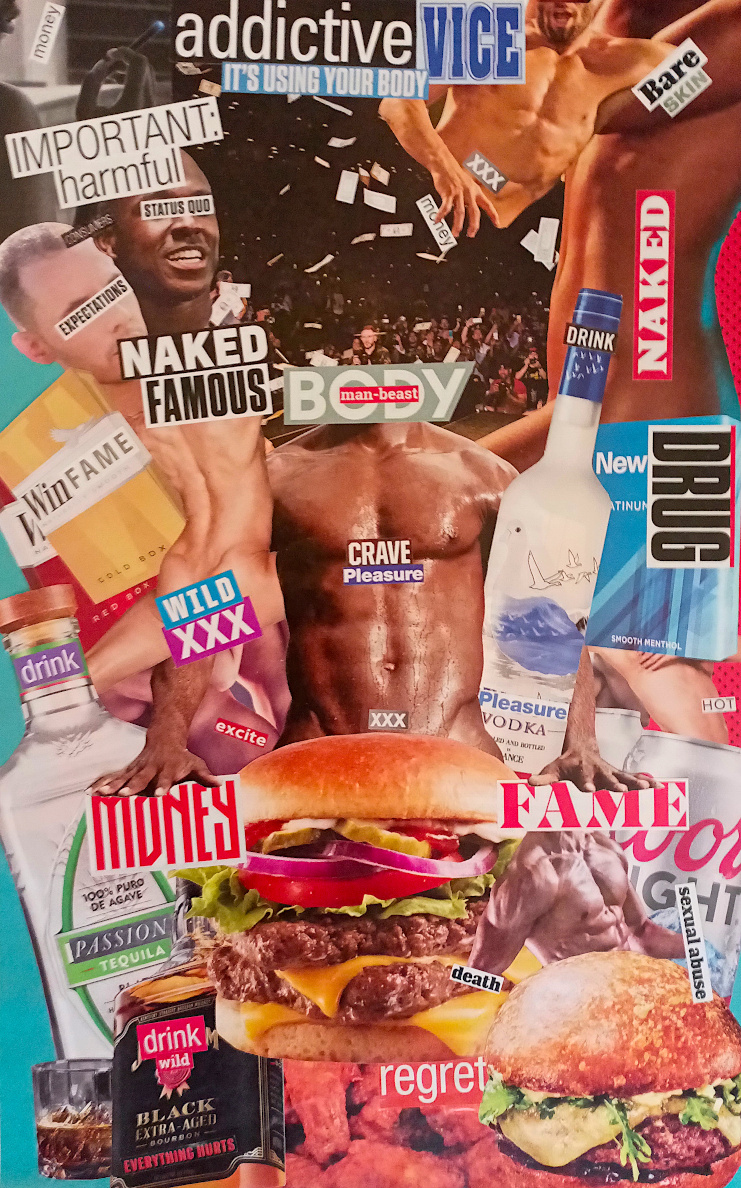Back • Return Home

Click for larger version.
Story / Meaning:
This is a paper collage made entirely from old ESPN magazines. The following is a little essay that describes some of the symbolism behind it...
Idols of the Marketplace
We cannot cover all of the symbols used here, but the title has three different meanings depending upon how one chooses to interpret it. All of them are related to each other and to the layers of imagery that the piece contains.
• Meaning #1: Advertising can be thought of as a form of “idolatry”. It is often used to entice people into giving up their resources (like money, attention, etc.) by appealing to their basest instincts and manipulating their insecurities. The best “consumer” is the one who is satisfied just enough to never be fully content. Sometimes the products themselves are literally designed to be addictive to try to keep one trapped within that cycle. Moreover, people can be addicted to not only substances, but also to feelings and experiences. In the worst cases, the psychological and physical harms that are caused can be accumulative, eventually leading to total poverty, disease, or death.
Generally, humanity has created a culture that promotes selfish hedonism and an endless chase for instant gratification, where people purposely attempt to profit at the expense of others with little thought about the harmful effects of their decisions. Long-term stability is being traded for transitory “pleasure”. It is hard to see when bodily appetites are left unchecked and wants are mistaken for genuine needs. Emotions can be fleeting and trends are constantly changing.
• Meaning #2: The term “idol” is also a synonym for a celebrity. People sometimes become worshipful of others to the point of obsession, without considering their character or their fallibility as human beings. This is sometimes known as the “halo effect”.
Inversely, people often compromise their values in various ways or objectify themselves in order to achieve fame and fortune. Nothing is sacred. Everything is now a “brand”, including your own name. In such a context, relationships become superficial and transactional (e.g.: some romances are devoid of true intimacy, being little more than an exchange of financial support for regular sex).
Your body and mind are priceless. They cannot be sold. Likewise, your time is precious, spend it wisely.
• Meaning #3: The term “idols of the marketplace” describes two types of logical fallacy, errors in reasoning that occur because there isn’t a perfect correspondence between language and reality:
1. Words can be used to make abstract concepts seem real. This process is known as “reification”. It is dangerous when labels become prejudices that justify the mistreatment of others. If you “idolize” yourself and see another as “less” than you in someway, then it becomes easy to rationalize just about any kind of behavior towards them, from the mildly insensitive to the absolutely inhumane.
2. A symbol could be mistaken for the thing which it symbolizes. This is sometimes called a “simulacrum”. Can you differentiate between fantasy and fact? How do you know when something is true? Much of what we perceive is dependent upon context. Things may look completely different from another point of view, but empathy can help us to understand where another is coming from.

By fully grasping meaning #3, it becomes easier to free ourselves from the destructiveness behind meanings #1 and #2.

